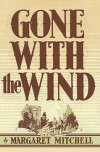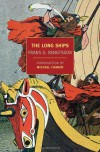4
Followers
22
Following
Tasseled Booklikes
A little corner to complement my book blog at tasseled.wordpress.com
Currently reading
The Axe
The Count of Monte Cristo
Gone with the Wind
The Coming of Conan the Cimmerian
Katharine of Aragon: The Wives of Henry VIII
Wolf Hall (Thomas Cromwell, #1)
The Arabian Nights: Tales of 1001 Nights, Volume 1
The Long Ships (New York Review Books Classics)
The Song of the Dodo: Island Biogeography in an Age of Extinction
Oxygen: The Molecule that Made the World (Popular Science)
 Note to self: I must re-read this book when I am older and wiser. Surely I will be able to appreciate it even more.
Note to self: I must re-read this book when I am older and wiser. Surely I will be able to appreciate it even more.
 It was a neat collection of very Murakami-like stories. Most of them have some kind of indirect connections to each other, like cats, or daiquiris, or a narrator working at PR department of a household electronics firm, or a man named Noboru Watanabe, or strange dreams that warp the reality, or uneatable spaghetti. Maybe because of that I had a hard time differentiating separate stories. The few that really stood out for me were The Second Bakery Attack, Sleep, and The Dancing Dwarf. I loved the quirkiness of the first one, strange contemplative nature of the second, and the dark fairytale feel of the third. Also, On Seeing the 100% Perfect Girl One Beautiful April Morning is incredibly beautiful and sad for being so short. These are probably the four I would recommend the most.
It was a neat collection of very Murakami-like stories. Most of them have some kind of indirect connections to each other, like cats, or daiquiris, or a narrator working at PR department of a household electronics firm, or a man named Noboru Watanabe, or strange dreams that warp the reality, or uneatable spaghetti. Maybe because of that I had a hard time differentiating separate stories. The few that really stood out for me were The Second Bakery Attack, Sleep, and The Dancing Dwarf. I loved the quirkiness of the first one, strange contemplative nature of the second, and the dark fairytale feel of the third. Also, On Seeing the 100% Perfect Girl One Beautiful April Morning is incredibly beautiful and sad for being so short. These are probably the four I would recommend the most.
 Mishima was a genius when it came to writing his anti-hero. He found the vilest darkness in the hearts of men and weaved it in a beautiful tapestry of horrors. BAM! There goes your own sanity as Mishima playfully smashes all the goodness you believed in. Not a book for everyone, but definitely a book for me.
Mishima was a genius when it came to writing his anti-hero. He found the vilest darkness in the hearts of men and weaved it in a beautiful tapestry of horrors. BAM! There goes your own sanity as Mishima playfully smashes all the goodness you believed in. Not a book for everyone, but definitely a book for me.
 I mentioned previously that I love popular science, along with pop culture and history. I also LOVE anything to do with Indiana Jones! In fact, I’ve had a huge crush on Harrison Ford as long as I could remember thanks to the movies. When I found out about the existence of this marvelous book that promised to combine all of the mentioned interests of mine, I knew I had to get it and pronto! Basically the authors took all three original Indiana Jones movies and picked it apart for various factoids they wanted to discuss. As a result, we got ourselves a book that tries to answer questions like, Do gigantic rolling boulders really exist? or, Which famous archeologists of the past might have inspired Indy’s character?
I mentioned previously that I love popular science, along with pop culture and history. I also LOVE anything to do with Indiana Jones! In fact, I’ve had a huge crush on Harrison Ford as long as I could remember thanks to the movies. When I found out about the existence of this marvelous book that promised to combine all of the mentioned interests of mine, I knew I had to get it and pronto! Basically the authors took all three original Indiana Jones movies and picked it apart for various factoids they wanted to discuss. As a result, we got ourselves a book that tries to answer questions like, Do gigantic rolling boulders really exist? or, Which famous archeologists of the past might have inspired Indy’s character?When I started reading the book, however, I was getting an uneasy feeling that it did not exactly deliver on its promises. The first part was quite exciting, especially given the fact that it is based on my least favorite movie out of the three – Indiana Jones and Raiders of the Lost Ark. I picked up a few very interesting facts and wrote down potential topics I would have liked to research more. I learned about Hiram Bingham who discovered Machu Picchu and whose autobiography on the event I would love to read. I also found out about Percy Harrison Fawcett, who was looking for a lost city in the Amazon that he referred to simply as “Z”, only to disappear forever in the jungle. The exciting tale even prompted me to put “The Lost City of Z” by Davis Grann on my to-be-read list. I would love to learn more about Roy Chapman Andrews who led expeditions to Gobi Desert and Mongolia and survived wild animals and bandits alike, all while making groundbreaking discoveries.
But the further I read, the less convincing the book sounded. It made me doubt the authors’ expertise when they repeatedly stated incorrect facts from the movies. In one such example, they were recalling a scene from Indiana Jones and the Temple of Doom, where singer Willie Scott is running around the jungle terrified of different animals she encounters, while Indy and Short Round are arguing about cheating in a game of cards. The authors state that Willie mistook a python for an elephant trunk and, when realized her mistake, screamed in terror. In reality Willie never found out that the alleged trunk was actually a snake, but rather threw it off her shoulder as annoyance. If the authors were actual fans of the movie, they surely would have remembered the hilarious ending to one of the funniest scenes in The Temple of Doom. Instead, they just came off as incompetent writers hired to put together a book in time for the release of The Kingdom of the Crystal Skull.
And speaking of incompetence, Gresh and Weinberg mentioned in the book that they both worked as college instructors in the past. If so, why was the book so poorly put together? Many sentences are badly structured, facts are jumbled and sometimes repeated in one paragraph several times just by rephrasing them, and don’t get me started on research. Half through the book I decided to check out the bibliography and was horrified to find that most research came from Wikipedia and similar online resources. Isn’t the first thing that students are taught about research is to never use non-scholarly sources? I could get on Wiki myself, read a bunch of articles written by other nonprofessionals, sum it all up, and send it all out to a publisher for a nice paycheck. I wanted to see actual scientific research, but found pure speculation and tale-telling. Was it entertaining to read? Yes. Did I pick up a few ideas for further reading? Absolutely. Can I trust everything the book says? Not a chance. Good thing I borrowed it from the library, where it’s going to go back next week and never return.
 Dear Mr. Poe,
Dear Mr. Poe,Let me start by saying that you are my very favorite author (like EVAH). I must have looked like Wednesday Adams, all crawled up in the corner with one of your stories while other kids read My Little Pony. I own multiple copies of you works, managing to convince myself I need yet another Raven or The Fall of the House of Usher every time I visit a bookstore. I squealed of joy when my English professor declared you a genius of macabre and included several of your shorts in our study! Yes I am that much of your fangirl!
With that off my chest I can now get to the point of my letter – that being my complete and utter confusion after reading the adventures of your Mr.Pym. Let me follow the narrative to sum up some of the points which left me puzzled and longing for your explanation. Would you be so kind as to convince me why exactly you needed to write that first chapter? For the life of me, I do not see the benefit of its existence. So, two young drunk friends decide to have some more fun by going sailing at night. As a terrible storm starts they both pass out, which in turn results in them being run over by a huge whaling ship. By some miracle they survive the imminent death and are returned safely home without getting in trouble with their parents. The chapter almost looks like a short story you thought of writing one night, but decided to continue on with a new adventure as the first one ended. And so chapter two opens with Arthur convincing his friend Augustus to smuggle him on board of Grampus – a whaling ship belonging to Augustus’ father.
The following part is my most favorite, not only because it is well written and very much believable, but because it is truly an example of your macabre style. Here we see Arthur in his hiding place on board the ship – a narrow box (a coffin reference perhaps?) with little space, no light, and food enough only for a few days. It is tucked away in between the rubble that is the ship’s cargo, and the only way out is a small trap door that leads to Augustus’ cabin. Arthur spends his days in here without knowledge of time or access to fresh air. Soon he becomes delirious and paranoid, wondering if his friend has forgotten about him and has left him here to die. Honestly, Mr.Poe, I do believe that you have a strange fascination with being buried alive, as you have at least one more work dedicated to the occurrence, and even in this novel you mention it several times. Yet I love the part very much, as it gives me everything I expect from a horror novel.
Now, of course, there are mutineers, who take over the ship and kill everyone. I find it rather convenient that Augustus is the only one left alive and not thrown into the see. Be it the captain who lived, perhaps we’d never have a chance to see Arthur again! But all is good, and Augustus befriends one of the mutineers, Dirk Peters, and reveals Arthur’s presence to him. Because Peters rather regrets his actions on board of Grampus, he suggests that the three of them take the ship back by… and here’s the best part… killing everyone else. Yes, Mr.Poe, you love your blood-spilling and gut-wrenching! After all that is done, you are not giving our friends any break, do you? You decide to sink the ship and leave them in the middle of nowhere with no food or water.
In this part we witness a great example of what people are capable of when driven by necessity. The trio and one of the mutineers that survived (Parker) suffer thirst and hunger until the latter suggests killing one of them to prolong life for others. Somehow I knew that you left poor Parker live just to get the cannibalism theme going, only to make him draw the short straw and get stabbed in the back a few pages later. After all we don’t need undeveloped characters, right? However, I felt rather cheated, because moments after Parker’s body is digested by our heroes, Arthur remembers the place where he had hidden an axe that would help them to get to the provisions under the flooded deck! I bet Parker would roll in his grave, if he had one of course… Somewhere at this point I also felt Arthur getting very impersonal with his narrative, his writing lacking any feelings, while the events becoming more and more surreal. You can see an example of it when Augustus dies of his wounds, while Arthur is passively reporting, My friend just died in agony, his leg came off when we tried to put him to sea, and sharks devoured his decaying body right in front of me, yet I don’t even express any kind of emotion. What? What??!!
And speaking of surrealism, Mr.Poe, what is up with the ending? From an ordinary adventure story it turned into something Wells-que, a la At the Mountains of Madness. I do understand that at the time the book was written the Antarctic continent was equivalent to a mythical new world to explore, which gives any author a license to invent whatever they want about it; however, the presence of strange color-changing water, white animals with red claws and teeth, and giant bullet-proof polar bears become all too fantastic in what seems to be a realistic narrative. Also, why is the ocean boiling when there are snows around? And who is that white figure that Arthur sees through the mist at the very end? Alas, you left me unsatisfied, Mr.Poe, and something tells me you are not about to explain yourself.
Finally, I have to thank you for arousing my interest in history of exploration of South Pole and educating me a little on the subject. I loved it that you kept it brief, but informative and well researched. Also, thank you for inspiring Jules Verne and others to venture into more marine fiction we all know and love! But please, please come back to writing about ghosts and creepy houses, and black cats, and fate, and death, and all that you are so good at!
Forever your literary admirer,
A.












